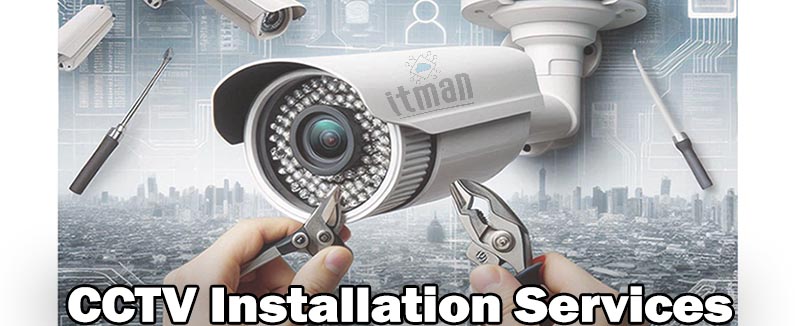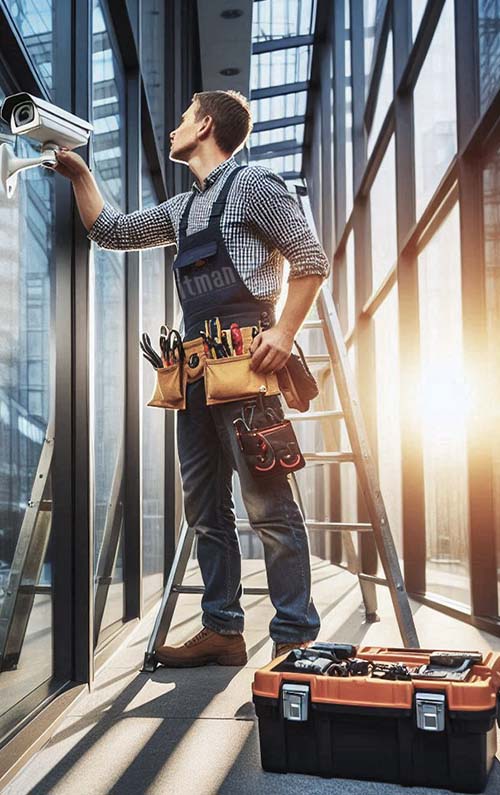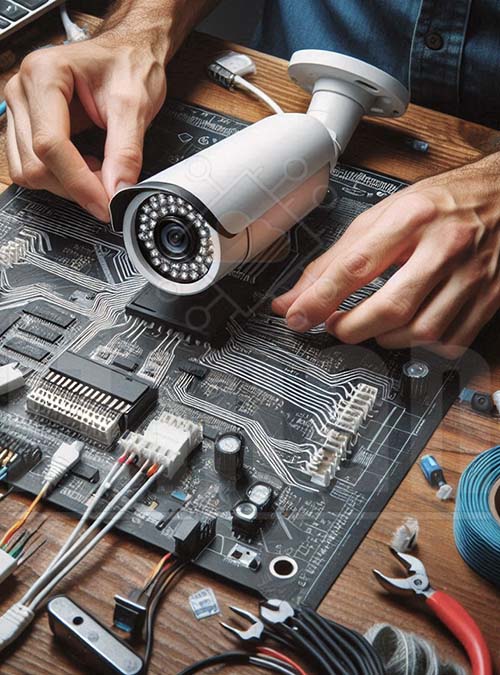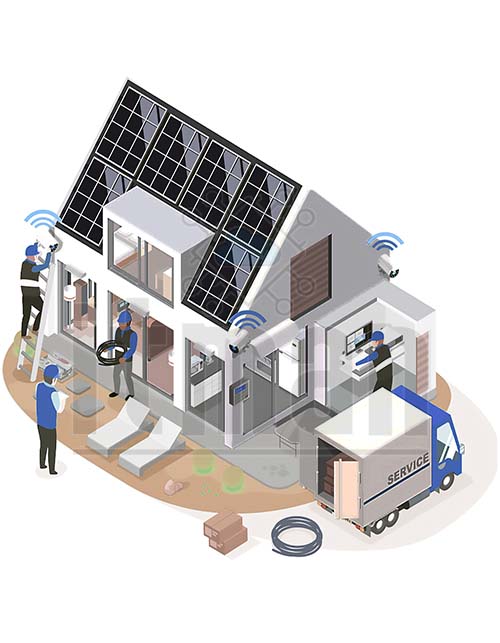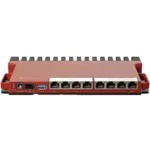
At ITMan, we provide comprehensive CCTV installation services. With our expert team, you can trust us to handle every aspect of your project with precision and professionalism. Contact us today to get started and experience the quality and reliability we offer.
At our company, we provide comprehensive services for Network installation , setup, and cabling of security cameras. Our skilled experts ensure that your project is completed in the shortest possible time. We also supply all the necessary equipment of the highest quality, taking care of every detail to meet your needs.
CCTV Installation services

CCTV installation involves setting up security cameras at strategic locations to monitor and record activities for safety and surveillance purposes. At our company, we take pride in delivering professional CCTV installation services, ensuring that every camera is installed with precision, properly configured, and seamlessly integrated into your security system. We handle everything from site assessment to cabling, ensuring that your property is fully protected with the best quality equipment. Here’s a step-by-step guide to CCTV camera installations , provided by our expert team:
- Site Assessment: We start by evaluating your property to determine the best camera locations, ensuring maximum coverage and security for CCTV installation .
- Planning and Design: Our specialists design a customized CCTV system tailored to your specific needs, selecting the appropriate cameras and equipment for your project of CCTV installation .
- Installation: Our skilled technicians install the cameras, mounts, and all necessary components, following best practices to ensure optimal performance.
- Cabling and Connections: We handle all cabling work, connecting cameras to recording devices and network systems, ensuring a clean and professional setup.
- System Configuration: Our team configures the system, setting up recording schedules, motion detection, and remote access to provide you with complete control and monitoring capabilities.
- Testing and Quality Check: We thoroughly test the entire system to ensure everything functions correctly, making any necessary adjustments to deliver the best possible security solution.
- Training and Handover: Finally, we provide training on how to use your new CCTV system and ensure you’re fully comfortable with its operation before handing over the CCTV installation project.
Trust us to handle your CCTV installation from start to finish with precision, efficiency, and the highest quality standards.
What equipment do we use for CCTV installation ?

For our CCTV installation , we utilize a comprehensive range of high-quality equipment to ensure the best possible security setup:
- CCTV Cameras: We use a variety of cameras, including dome, bullet, PTZ (Pan-Tilt-Zoom), and IP cameras, based on the specific needs of your location.
- Digital Video Recorders (DVRs) and Network Video Recorders (NVRs): Depending on whether your system is analog or IP-based, we use DVRs or NVRs to store and manage video footage.
- Cabling: We provide all necessary cabling, including coaxial cables for analog systems and Ethernet cables (Cat5e, Cat6) for IP cameras, ensuring reliable and high-quality connections.
- Power Supply Units: We use regulated power supplies to ensure stable and uninterrupted power to all cameras and recording devices.
- Mounting Hardware: Our installations include sturdy and weather-resistant mounts and brackets to securely position cameras in the optimal locations.
- Monitors: For on-site monitoring, we provide high-resolution monitors that deliver clear and detailed video footage.
- Network Equipment: For IP camera systems, we include routers, switches (like Cisco Switches) , and PoE (Power over Ethernet) injectors or switches to support the network infrastructure.
- Backup Power Solutions: We integrate Uninterruptible Power Supplies (UPS) to ensure continuous operation during power outages.
Our use of these reliable and industry-standard components ensures that your CCTV Installation is robust, efficient, and perfectly tailored to your security needs.
What is CCTV?

CCTV, which stands for Closed-Circuit Television, is a video surveillance system used to monitor and record activities in specific areas. The term “closed-circuit” refers to the fact that the signal from the cameras is transmitted to a limited number of monitors or recording devices, rather than being broadcast publicly. This makes CCTV a private and controlled system, often used for security purposes.
CCTV systems typically consist of cameras, recording devices (like DVRs or NVRs), monitors, and sometimes additional components such as motion detectors and alarms. The cameras capture video footage, which is then transmitted to the recording device and/or monitor for real-time viewing or later review. Modern CCTV systems often integrate with network technology, allowing remote access and control via smartphones, tablets, or computers.
The primary purpose of CCTV is to deter and detect criminal activity, monitor sensitive or restricted areas, and provide evidence in the event of an incident. It’s widely used in various settings, including commercial buildings, industrial sites, public spaces, transportation systems, and private residences.
CCTV has evolved significantly with advancements in technology. High-definition cameras, night vision, motion detection, and AI-driven analytics are now common features, enhancing the effectiveness and reliability of CCTV systems. The use of CCTV continues to grow, driven by the increasing need for security and the availability of more sophisticated and affordable equipment.
What are the Uses of CCTV?
CCTV systems are widely used for various purposes, including:
- Security Monitoring: CCTV cameras are extensively used for monitoring and securing premises, including residential properties, commercial establishments, and public areas. They help in deterring crime and providing evidence in case of incidents.
- Surveillance: Businesses use CCTV for surveillance to monitor employees, track customer behavior, and ensure adherence to safety protocols. This helps in maintaining a secure work environment and improving operational efficiency.

- Traffic Management: In urban areas, CCTV cameras are deployed to monitor traffic flow, manage congestion, and detect traffic violations. This aids in improving road safety and enforcing traffic regulations.
- Public Safety: CCTV systems are used in public spaces such as parks, shopping malls, and transportation hubs to enhance public safety. They help in quickly responding to emergencies and managing crowds.
- Remote Monitoring: CCTV cameras enable remote monitoring through network connections, allowing users to view live footage from anywhere in the world using a computer or mobile device. This feature is particularly useful for remote site management.
- Evidence Collection: In the event of an incident, CCTV footage serves as valuable evidence for law enforcement and legal proceedings. It provides a clear record of events and helps in investigations and resolving disputes.
- Loss Prevention: Retailers use CCTV to prevent theft and shoplifting. Surveillance cameras help in identifying suspicious activities and reducing inventory losses.
- Operational Oversight: In industries and manufacturing, CCTV cameras are used to monitor production processes, ensure quality control, and maintain safety standards. This helps in identifying issues and improving overall efficiency.
CCTV systems play a crucial role in enhancing security, safety, and operational efficiency across various sectors.
How to Cable for CCTV Installation
Proper cabling is essential for the effective CCTV Installation and camera Installation. Here is a step-by-step guide to help you with the cabling process:
1. Planning and Preparation for CCTV Installation
- Assess Requirements: Determine the number of cameras, their locations, and the type of cables needed (e.g., coaxial, Ethernet).
- Create a Layout: Design a cabling plan that includes the path for cables, locations of cameras, and connection points.
2. Choosing the Right Cables for CCTV Installation
- Coaxial Cables: Used for analog cameras. They consist of a central conductor, insulation, a shield, and an outer cover.
- Ethernet Cables (Cat5e/Cat6): Used for IP cameras. They support both data and power (PoE) and are suitable for digital transmission.
3. Running the Cables
- Measure and Cut: Measure the distance from the camera to the recording device or network switch. Cut the cable to the required length, leaving a little extra for adjustments.
- Avoid Interference: Route cables away from electrical cables to minimize interference. Use cable clips or conduits to secure and protect the cables.
- Drill Holes: Drill holes in walls or ceilings to pass the cables through. Ensure the holes are sized appropriately to prevent damage to the cables.
4. Connecting the Cables for CCTV Installation
- Coaxial Cables:
- Attach Connectors: Strip the cable ends and attach BNC connectors. Ensure a secure connection by twisting the connector onto the cable.
- Connect to Camera and DVR: Plug the BNC connectors into the CCTV camera and the Digital Video Recorder (DVR).
- Ethernet Cables:
- Terminate the Cable: Strip the cable ends and attach RJ45 connectors. Follow the T568A or T568B wiring standards for correct pin configuration.
- Connect to Camera and Network Switch: Plug the RJ45 connectors into the IP camera and network switch or PoE injector.
5. Powering the Cameras for CCTV Installation
- For Coaxial Cables: Use separate power cables to supply power to the cameras, or use a power supply unit.
- For Ethernet Cables (PoE): Connect the camera to a PoE switch or injector to provide both data and power over the same Ethernet cable.
6. Testing the Installation
- Check Connections: Verify that all connections are secure and properly seated.
- Power Up: Turn on the cameras and check the video feed to ensure proper functionality.
- Adjust Camera Angles: Position the cameras as needed for optimal coverage and view.
7. Finalizing the Installation
- Secure Cables: Use cable ties or clips to bundle and secure cables along their paths.
- Labeling: Label cables and connections to simplify future troubleshooting and maintenance.
Proper cabling ensures reliable performance and minimizes potential issues with CCTV Installation . Follow these steps to achieve a professional and effective CCTV Installation .
